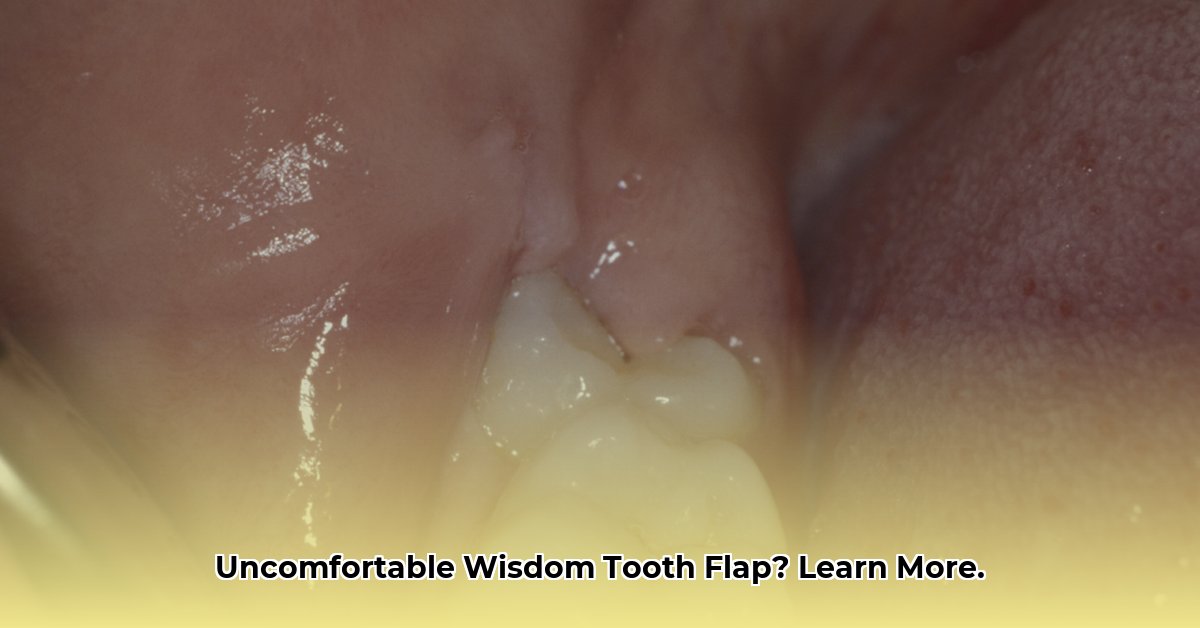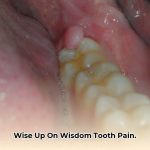What is a Dental Operculum?
A dental operculum is a flap of gum tissue that partially covers a tooth, most commonly a wisdom tooth as it erupts. Think of it like a small hood or curtain of gum. While not inherently a problem, an operculum can create a trap for food particles and bacteria, increasing the risk of infection and discomfort. A diagram illustrating an operculum over a partially erupted wisdom tooth would be helpful here.
Why Does it Happen?
Operculums typically form due to insufficient space for the wisdom teeth to fully emerge. This is called impaction. The tooth may erupt at an angle or only partially break through the gums, leading to the formation of the operculum. Other potential causes include excess gum tissue or the angle of tooth eruption. Some studies suggest a genetic component may also be involved.
Recognizing Pericoronitis: Is Your Operculum Infected?
Pericoronitis is an infection of the gum tissue surrounding a partially erupted tooth, often beneath an operculum. It’s crucial to recognize the signs and symptoms:
| Symptom | Description |
|---|---|
| Pain | Throbbing or constant ache, often worse when chewing |
| Swelling | Puffiness and tenderness around the affected tooth |
| Redness | Noticeable inflammation and discoloration of the gum |
| Bad Breath | Persistent unpleasant odor or taste |
| Pus Drainage | Whitish or yellowish discharge |
| Trismus | Difficulty opening your mouth fully |
| Fever | Possible indication of a more serious infection (seek immediate attention) |
A photo of pericoronitis (not too graphic) would be helpful here.
Treatment Options: Finding Relief
Treatment for an operculum and pericoronitis varies depending on the severity of the condition.
Home Care for Mild Discomfort
For mild discomfort, home care can provide temporary relief:
- Warm Salt Water Rinses: Dissolve ½ teaspoon of salt in 8 ounces of warm water. Gently swish for 30-60 seconds, 2-3 times daily.
- Over-the-Counter Pain Relievers: Ibuprofen or acetaminophen can help manage pain and inflammation. Follow package instructions.
Important: Home care is not a substitute for professional dental treatment. If symptoms persist or worsen, consult a dentist.
Professional Treatment
Your dentist may recommend one or more of the following:
- Professional Cleaning: A thorough cleaning beneath the operculum removes trapped debris and bacteria.
- Antibiotics: If infection is present, antibiotics will help combat the bacteria and reduce inflammation.
- Operculectomy: Surgical removal of the operculum, often performed with a scalpel or laser. Laser operculectomy may offer faster healing.
- Wisdom Tooth Extraction: Removing the impacted wisdom tooth offers a long-term solution, preventing recurring issues. Your dentist can discuss the potential risks and benefits of extraction.
Preventing Future Problems
Maintaining excellent oral hygiene is crucial for preventing operculum-related issues.
- Brushing: Brush twice daily, paying attention to the back teeth.
- Flossing: Daily flossing removes food particles and plaque from between teeth and under the gumline.
- Interdental Brushes: These small brushes can clean hard-to-reach areas around wisdom teeth.
- Water Flosser: This device can help flush out debris from under the operculum and around wisdom teeth.
- Regular Dental Check-ups: Professional cleanings and examinations allow your dentist to monitor your oral health and identify potential problems early.
- Antimicrobial Mouthwash: Some studies suggest that certain mouthwashes can help control bacterial growth. Consult your dentist for recommendations.
Finding a Dentist
Don’t hesitate to seek professional care if you experience any symptoms of pericoronitis. Early diagnosis and treatment are essential.
Find a Dentist Near You
Frequently Asked Questions (FAQ)
- How long does recovery take after an operculectomy? Healing typically occurs within a few days to a week.
- Is operculectomy painful? Local anesthesia numbs the area during the procedure. Some post-operative discomfort is normal, manageable with over-the-counter pain relievers.
- What is the cost of treatment? Costs vary based on the treatment required and your location. Your dentist will provide a specific estimate.
- Can I prevent operculums from forming? While not always preventable, maintaining good oral hygiene and regular dental check-ups can significantly reduce the risk.
- What are the long-term complications of untreated pericoronitis? Untreated pericoronitis can lead to more serious infections, including spreading to the surrounding tissues or even the bloodstream.
Disclaimer: This information is for educational purposes only and should not be considered medical advice. Consult with a qualified dental professional for diagnosis and treatment of any oral health concerns.
- Water Mill Electricity Generator Provides Free Home Power - December 16, 2025
- Water Wheel Electric Generator Provides Free Home Electricity - December 15, 2025
- Choosing the Right Portable Hydro Turbine for Your Needs - December 14, 2025
















